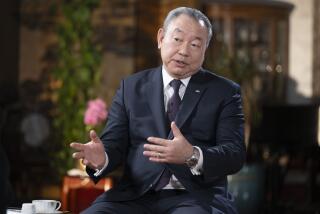Hundreds greet Taiwanese president in L.A. Chinatown visit
Taiwanese President Ma Ying-jeou greeted hundreds of flag-waving supporters in Los Angeles’ Chinatown on Tuesday, an unusual public appearance on American soil that was a sign of the island’s improving relationship with China.
Ma was on his way home after visiting Sao Tome and Principe, Burkina Faso and Honduras — three of Taiwan’s remaining diplomatic allies. The U.S. State Department termed the visit a “transit” that is “consistent with the unofficial nature of our relations with Taiwan.”
Such stopovers are a gauge of how well a Taiwanese leader is getting along with the U.S., and by extension, China, which considers Taiwan a renegade province. In 1995, then-Taiwanese President Lee Teng-hui spoke at his alma mater, Cornell University, which prompted China to fire missiles into the Taiwan Strait. Since then, Taiwanese presidents, who are democratically elected, have mostly limited themselves to private meetings in hotels.
Ma’s willingness to negotiate with China has pleased U.S. officials but angered some independence-leaning Taiwanese, who fear he is heading toward eventual reunification.
“It shows there’s a great deal of confidence between Taipei and Washington that Ma will stay within the ground rules of not making a huge political splash during his transit,” Alan D. Romberg, director of the Stimson Center’s East Asia Program, said of Ma’s Chinatown appearance.
Roger Xing, a spokesman for the Consulate-General of the People’s Republic of China in Los Angeles, offered no comment.
“Regarding Ma’s trip, we really do not have anything to say,” he said in a text message.
The region’s pro-China immigrants, who braved desert heat last June to welcome Chinese President Xi Jinping to Southern California, did not object publicly to Ma’s visit. Sue Zhang, a leader of the Roundtable of Chinese American Organizations, said China and Taiwan should work together against Japan to protect disputed islands near Taiwan.
“Everyone should cooperate. It’s not about unification. It’s about working together,” Zhang said. “When Ma comes to Los Angeles, the Taiwanese people feel very warmly toward him and are obviously very happy to see their leader.”
Ma arrived at the Chinese Consolidated Benevolent Assn. on Broadway in the afternoon after visiting the Ronald Reagan Presidential Library in Simi Valley. In remarks that lasted about 15 minutes, he spoke in Mandarin of his long-standing relationship with Chinatown organizations, which are composed mostly of Cantonese immigrants.
As a graduate student at Harvard University, he said, he became a spokesman for the local benevolent association, forging a “blood is thicker than water” bond.
He told the audience that Taiwan and China should cooperate and work together, noting the progression from a state of near-war to a largely peaceful relationship.
Even though fewer than 30 countries have diplomatic relations with Taiwan, more than 100 allow Taiwanese citizens to enter their borders without visas, which is a sign of respect, Ma said.
“We in Taiwan are working hard to improve relations with China,” he said.
Despite an influx of immigrants from China in recent decades, Los Angeles Chinatown organizations remain generally supportive of Taiwan. In San Francisco, the Consolidated Benevolent Assn. no longer flies the Taiwanese flag and has stopped celebrating Double 10 Day, which commemorates the Republic of China’s birth.
Some who came to see Ma on Tuesday were longtime U.S. citizens but also Ma’s constituents. Every four years, thousands of local Taiwanese Americans travel to the island to vote in presidential elections.
“He wants to let us know he never forgets about us. Even though his situation at home is tough, he really cares about overseas Chinese from Taiwan,” said Christine Chia, 58, a San Gabriel Valley resident who has returned to Taiwan twice to vote for Ma.
As he left the Benevolent Assn., Ma shook hands with some in the crowd, then laid a wreath at the nearby Sun Yat-sen statue before paying his respects at the Ma Family Assn.
At one point, the U.S. government was so displeased with Ma’s predecessor, Chen Shui-bian of the Democratic Progressive Party, that it relegated Chen to a brief fueling stopover in Alaska.
Supporters of the party, who usually protest when presidents from the opposing Kuomintang visit, said they did not bother this time because Ma is in his last term and facing low approval ratings at home.
“He keeps thinking that if he talks it through with China, there will be peaceful unification. This is something most Taiwanese cannot accept,” said Jerome Cheng, president of the DPP’s U.S. West chapter.
cindy.chang@latimes.com
More to Read
Sign up for Essential California
The most important California stories and recommendations in your inbox every morning.
You may occasionally receive promotional content from the Los Angeles Times.










